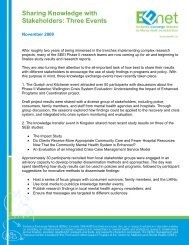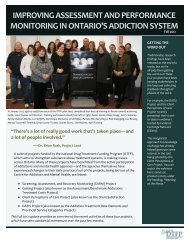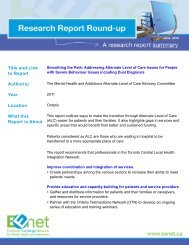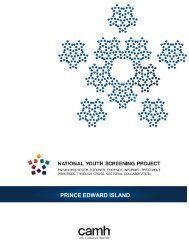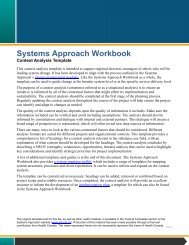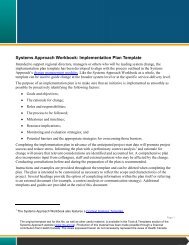Implementation of Early Psychosis Intervention Program ... - EENet
Implementation of Early Psychosis Intervention Program ... - EENet
Implementation of Early Psychosis Intervention Program ... - EENet
You also want an ePaper? Increase the reach of your titles
YUMPU automatically turns print PDFs into web optimized ePapers that Google loves.
20agreement; low caseloads (10 to 15 per clinical staff) to provide more comprehensive care andbuild relationships; and social interventions to help individuals maintain or re-establish10, 11community roles.tThree potential periods or stages <strong>of</strong> treatment initiation have been identified for early psychosisintervention: stage (1): sub-threshold when individuals experience distress and impairments thamay signal more serious disorder; stage (2): intervention as soon as possible after the onset <strong>of</strong>positive psychotic symptoms where the aim is to reduce the duration <strong>of</strong> untreated psychosis(DUP); and stage (3): intervention with established cases <strong>of</strong> psychosis, where the aim is to12, 13provide comprehensive treatment during the critical first few years <strong>of</strong> diagnosed illness.A growing body <strong>of</strong> research is emerging on the effectiveness <strong>of</strong> intervention at each <strong>of</strong> thesestages. In a review <strong>of</strong> the benefits <strong>of</strong> early intervention services compared to standard care (stage3), Bird 14 showed that clients <strong>of</strong> EPI services were less likely to relapse or be admitted tohospital; had reduced symptoms, both positive and negative; were more likely to stay intreatment; and were more likely to receive psychosocial interventions. In reviews <strong>of</strong> the impact<strong>of</strong> stage 2 interventions to minimize DUP, studies have shown that a longer DUP is associatedwith poorer outcome once treatment is initiated. 15,16 Evidence on intervention at stage 1 is lessconclusive and intervention at this stage has raised discussions about what is appropriate andethical to <strong>of</strong>fer. Regarding length <strong>of</strong> treatment, EPI has been presented as a time limitedintervention <strong>of</strong> 2 to 3 years, but debate and research is emerging on the appropriate length <strong>of</strong> stay(perhaps tied to client needs) and what is needed to transition individuals successfully to other17, 18forms <strong>of</strong> support.icDr. Patrick McGorry was one <strong>of</strong> the founding developers <strong>of</strong> the <strong>Early</strong> <strong>Psychosis</strong> Prevention and<strong>Intervention</strong> Centre in Australia in the early 1990s. Since then, early psychosis intervention hasbeen endorsed in numerous national policies/strategies. It is now well established as a therapeutapproach in North America, Europe and Australasia. 19 In the UK, a policy commitment to EPIhas been in place since 2001, and a recent report indicated 145 teams in operation, serving10 Bird, V., Premkumar, P., Kendall, T., Whittington, C., Mitchell, J., & Kuipers, E. (2010). <strong>Early</strong> interventionservices, cognitive-behavioural therapy and family intervention in early psychosis: Systematic review. The BritishJournal <strong>of</strong> Psychiatry : The Journal <strong>of</strong> Mental Science, 197(5), 350-356.11 Singh & Fisher, 200512 McGorry, 201213 Singh & Fisher, 200514 Bird et al., 201015 Marshall, M., Lewis, S., Lockwood, A., Drake, R., Jones, P., & Croudace, T. (2005). Association betweenduration <strong>of</strong> untreated psychosis and outcome in cohorts <strong>of</strong> first-episode patients: A systematic review. Archives <strong>of</strong>General Psychiatry, 62(9), 975-983.16 Norman, R.M.G., Lewis, S.W., & Marshall, M. (2005). Duration <strong>of</strong> untreated psychosis and its relationship toclinical outcome. British Journal <strong>of</strong> Psychiatry, 187(suppl. 48), s19-s23.17 Norman, R. M., Manchanda, R., Malla, A. K., Windell, D., Harricharan, R., & Northcott, S. (2011). Symptom andfunctional outcomes for a 5 year early intervention program for psychoses. Schizophrenia Research, 129(2-3), 111-115.18 Singh, S. P. (2010). <strong>Early</strong> intervention in psychosis. The British Journal <strong>of</strong> Psychiatry : The Journal <strong>of</strong> MentalScience, 196(5), 343-345.19 Marshall, M., & Rathbone, J. (2011). <strong>Early</strong> intervention for psychosis. Cochrane Database <strong>of</strong> Systematic Reviews(Online), (6)(6), CD004718.



